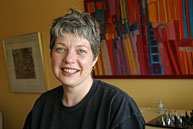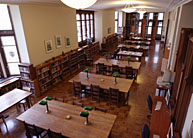Kaleidoscope
Jo Ann Lévesque: Resources for researchers
 Photo: Owen Egan
Photo: Owen Egan |
|
As the Research Officer in the Faculty of Arts, Jo Ann Lévesque's job is to help professors get grants that measure in the six- to seven-figure range. However, Lévesque, who came to McGill from the Social Sciences and Humanities Research Council (SSHRC), knows what a small grant can do to change people's lives.
At one point she was a volunteer for an NGO that worked in Latin America. One project in Colombia provided clean water for women to wash their clothes. Along with that, a centre was built that would allow young people and women to learn skills they could use in the workplace.
"It worked very well, and it cost maybe $40,000 for the two projects. For this small amount the organization was able to help so many people," she recalled. However, after a few years, she gave up the NGO, because of frustration with the grant process of the Canadian International Development Agency.
"A small project at CIDA is the same as for a big project. It could cost you $10,000, but the work is the same as a project of $3 million. It can be very exhausting," she said.
Not so in her current line of work. Lévesque is a no-nonsense grant guru, a position she said McGill's Faculty of Arts has long been in need of. She knows of what she speaks: with a PhD in Education from the Université de Montréal, and a continued research interest in her field, Lévesque knows both the university culture and the granting process inside and out.
Lévesque's energetic approach has won her fans. Dean of Arts Carman Miller was instrumental in creating Lévesque's job. He has high hopes for her.
"I don't think it's unrealistic that we can triple research funding in four years. With Jo Ann's leadership, we can do that," he said.
Miller pointed out that Lévesque is approaching private sector partners for research funding. Lévesque's position is not unique in Canada, but it is rare. Miller expects that to change.
"Faculty-specific research, I think, is the way to go," he said.
Lévesque is blunt in her assessment of what needs to be done.
"At McGill, in social science, they're not very good at getting major grants," she said. By major, she means the kind of money she was dispensing at SSHRC, where she was program officer for the Initiative for the New Economy grants, which were worth up to $3 million.
To get that kind of funding, you have to know what you're doing, and you have to be doing it with other people, said Lévesque. And you can't expect success right away.
"Nobody will give you $3 million to work with lots of other people if you've never worked with others before. Nobody will. If you think maybe you'll get it because of your publications, forget it, it won't work.
"My first task is to help people who want major grants build research teams, so in five or six years they can get these kinds of grants," she said.
That kind of timeline requires planning. To that end, Lévesque is working with departments and interested professors to create research strategies. Among other tasks, she tries to identify potential partners that researchers can approach. Partnerships have to be legitimate: Lévesque said she could spot "partnerships of convenience" on grants that came into SSHRC easily. Learning to collaborate with others is a huge component of shaking fruit from the money tree.
"University culture doesn't go along with enterprise culture. You have to build strong partnerships that will stand not only for the five years of the grant, but also after this period," she said. Many researchers don't appreciate the consequences of this commitment.
"They're not very conscious of what this really means in their research, and in their own life. It's very time consuming."
One partnership she's particularly proud of is the Shakespeare and Performance Research Team with Paul Yachnin. For this program, Lévesque approached the director of EuroDisney, who in turn recommended a company called Trizart-Alliance. This company plans to be a partner in building the high-tech theatre the project will use for Shakespearean research.
"Once the first contact is done, it's the researcher who is doing it by himself," she said of her role.
Despite the obvious relish she brings to her job, Lévesque wasn't certain she even wanted to come to McGill.
"I saw this, but to be honest with you, I wasn't looking to move because I had just done a lot of renovations to my house. But I thought, maybe I should phone to see if my English is sufficient."
Associate Dean of Arts Hudson Meadwell called her back and asked her to apply, but still she hesitated.
"At that time I had a lot of work going on. I had a conference in Toronto, and a lot of things for SSHRC, so I forgot about the deadline. Two days before the deadline, Hudson called me saying 'I want you to apply.'"
She started September 3 of 2002. Moving from SSHRC to McGill was a bit of a culture shock, but she threw herself into her work. Deadlines for major grants were coming up in October, so she met a lot of people very quickly after her arrival.
"I was working like a fool on this: I met new researchers -- people from education, religious studies."
No doubt she'll be meeting plenty more.
 |
||||
|
"One of the most important challenges that is facing Muslim intellectuals today is how to accommodate the Muslim woman in the modern reality." |
||||
Birks Reading Room born again
The Birks Reading Room is a little-known, but much-loved study space at McGill. Students remember the small library, sometimes after they've forgotten their professors' names.
 Revamped space for readers
Revamped space for readersPhoto: Owen Egan |
|
"We've had former students come in here with their children to show them where they used to study," said library assistant Allan Youster.
Walking into the small library on the second floor of the Birks Building, those alumni might think their memory is playing tricks on them. The room recently underwent a renovation that has greatly improved the ambiance in the already beautiful space. Most of the work was done in February.
The walls have a fresh coat of paint, and the parquet oak floor has been replaced. The previous flooring was crumbling under years of use.
"You could tell where someone was in the library when they were walking -- the floor was like a xylophone," said Youster.
With a new floor came new wiring. Every table on the main floor of the room has plugs for laptop computers. Wireless Internet was also installed -- although Youster is looking for a way to hide the unsightly wireless node that hangs on the wall near the library entrance. Another technical improvement he's much happier with is the new flat-screen computers, with state-of-the-art silent keyboards. These rubberized work-pads can actually be rolled up.
"Allan called me up and held the phone out, and all I could here was clackity clackity clackity," recalls McLennan Librarian Kendall Wallis. The high-tech computers solve the noise problem, and also provide more space on the computer worktables.
Wallis is a huge fan of the Birks room. He's particularly pleased with the new lamps on the study tables.
"The old ones were from Zellers, and were as ugly as anything," he said. The new, more graceful lamps create little pools of light on the table, that create an effect of having a private study area, even on a table that could be shared by six students.
Wallis and Youster's enthusiasm for the project meant they sometimes took matters into their own hands. The legs of the old fashioned hard-back chairs were scratching the floors. Some sort of cushioning was required. Youster showed unpadded chair legs to Wallis, who was appalled.
"Kendall and I jumped into my car and went straight to Réno-Dépot, and we came right back here and put on the pads," said Youster.
Dean of Religious Studies Barry Levy said that the renovation came about due to efforts from all over the university.
"The support to do this came from numerous offices on campus -- the libraries contributed, the office of technology, VP (Finance). It really was a cooperative venture," said Levy. "It's a classic space, but it is scientifically up-to-date."
Wallis suggested that charity might be a good word to describe the effort.
"No it's not," said Levy. "There was a lot of goodwill."
"Ah -- goodwill. That's more of a universally accepted theological virtue," replied Wallis.
 |
||||
|
"People who think they've waited their two hours [after drinking] before driving home may need to actually wait six... The drinker in the process of re-attaining sobriety is likely to be more dangerous, for example, than the drinker who is still imbibing." |
||||

